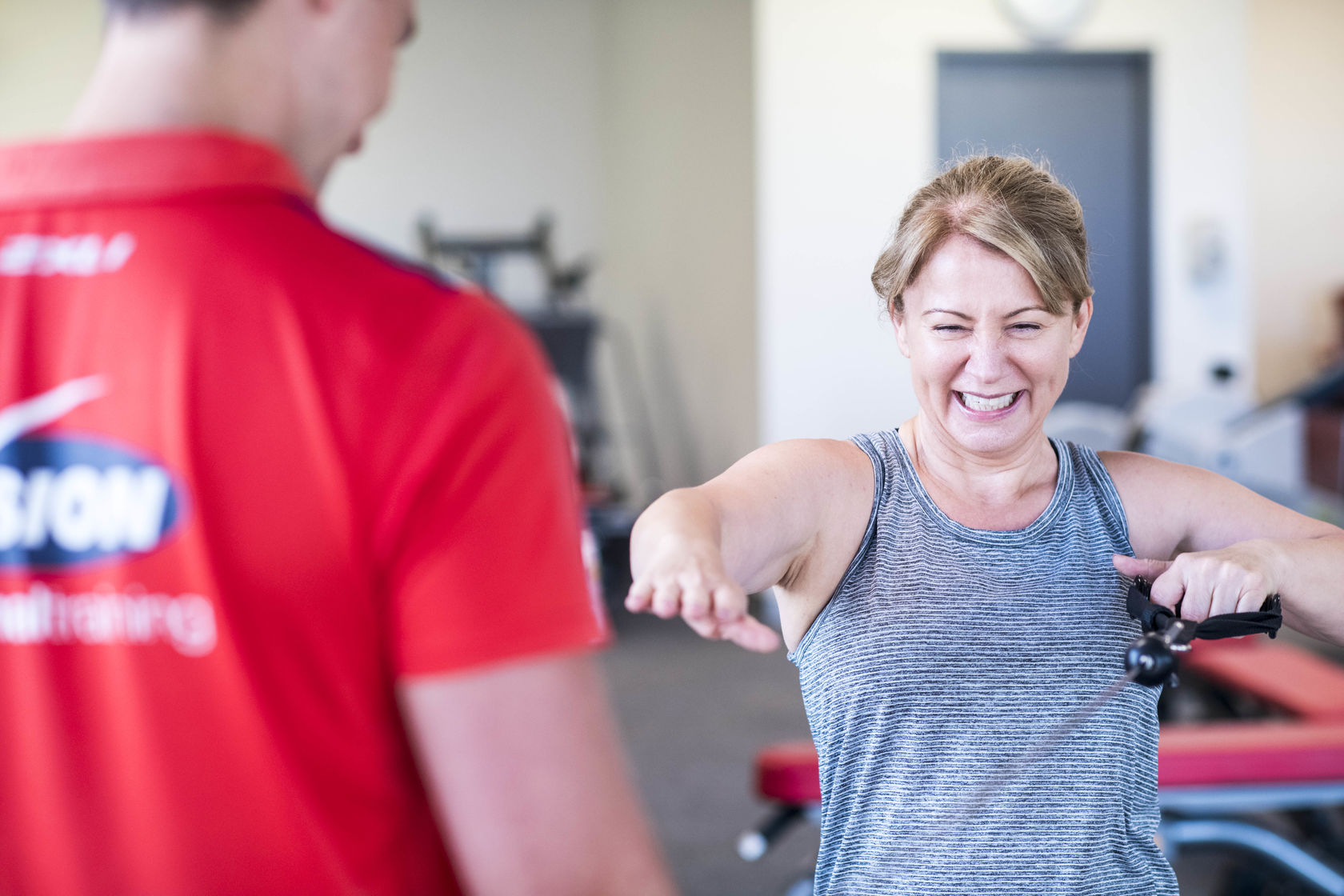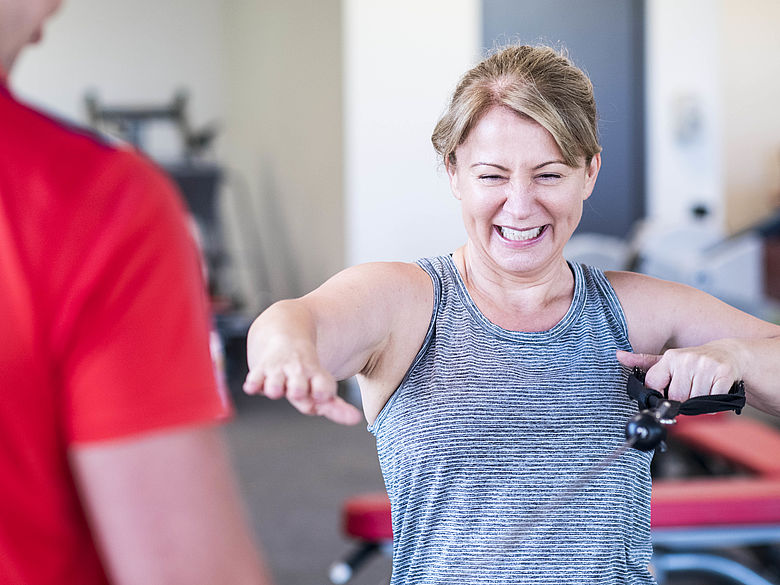'The joy of menopause is the world's best-kept secret. Like venturing through the gateway to enter an ancient temple, in order to claim that joy a woman must be willing to pass beyond the monsters who guard its gate. As you stand at the brink of it, it can appear that only darkness, danger and decay lie beyond. [But] … as thousands of women from all cultures throughout history have whispered to each other, it is the most exciting passage a woman ever makes.'
Leslie Kenton, Passage to Power; London: Ebury Press; 1995
The Menopause.
For most women, the idea of impending menopause is terrifying.
However, it's a physical reality and a growing concern for women aged over 40. It's also an issue many fitness professionals have traditionally not understood, or simply ignored.
Today, as health and fitness professionals, we are in a unique position to help Women manage menopause and improve their quality of life, by diminishing menopausal symptoms. With the right program we can also assist in prolong their lives by countering menopause-related conditions and diseases, and boosting self-esteem.
When women enter the menopausal years, they may not realise at first what is happening. They're thinking that the room is getting excessively warm, they wonder why they're so short with their kids or spouse, they wake in the night, and can't get back to sleep.
It can be a little unnerving at times, but, just as in adolescence, with the right support and guidance you will survive this normal transition into a new potentially more rewarding stage of life.
There are some lucky women who have very few symptoms or problems as they pass through menopause, however most have at least some temporary symptoms, and some struggle with problems that really disrupt their lives.
So, what is Menopause?
The menopause refers to that time in every woman's life when her period stop and her ovaries lose their reproductive function. Usually, this occurs between the ages of 47 and 55 years. Menopause is influenced by a change in hormone levels. During a woman's fertile years, her ability to produce an egg each month is associated with the release of oestrogen. Oestrogen is mainly produced by the ovaries, though small amounts are also made by the adrenal glands and by the placenta of a pregnant woman.
As women get older, their store of eggs in the ovary decreases and their ability to conceive diminishes. At this time, less oestrogen is produced, causing the body to behave differently. However the body does not stop producing oestrogen overnight, and the process can even take several years, during which symptoms arise gradually. This gradual change is called the 'peri-menopause'.
Peri-menopause is the stage before natural menopause and is often the time when women begin to experience the symptoms of menopause such as;
- Weight gain
- Mood swings
- Cravings
- Fatigue
- Irritability
- Hot flushes
- Insomnia
- Headaches
- Decreased libido
- Vaginal dryness
- Incontinence
- Increased risk of conditions and diseases like heart disease and osteoporosis
Menopause is the final menstrual period. You only know you have had a final menstrual period if you have had no period for 12 months. After this, the stage is known as post menopause.
What is actually happening and how does it feel?
For some women, this loss of reproductive ability may be deeply felt, and for all women the menopause is a personal experience, not just a medical condition.
Menopausal symptoms are caused by changes in the levels of these hormones. These changes usually happen over months or years as menopause nears, however, if menopause has been induced by surgery or cancer treatment, there can be a sudden drop in some of these hormones, causing symptoms to be more severe.
The 3 main hormones in their body affected are;
1. Oestrogen - the production of oestrogen fluctuates during the transition to menopause. It can increase because ovulation can occur twice in some peri-menopausal cycles (which can lead to very high hormone levels). As the final period is near and egg numbers decrease, oestrogen levels drop, falling by as much as 90% at menopause.
2. Progesterone - Progesterone, another natural female hormone, decreases toward menopause. This is because progesterone is produced only if an egg is released (ovulation). The release of progesterone usually prepares the uterus for a fertilised egg and pregnancy. With menopause, ovulation stops and so progesterone levels drop. Because of the fluctuations in hormones, women can have very heavy bleeding around this time, along with other menopausal symptoms.
3. Testosterone - Rather than a sudden or dramatic drop at menopause, testosterone decreases gradually with age. In some women, levels fall by half between the ages of 20-40 years. Testosterone is important for a female as it has a role in women's sexual desire and arousal, overall emotional wellbeing, bone and muscle strength.
What are the Risks Associated with Menopause?
A healthy lifestyle during the menopause transition helps with maintaining a healthy weight, bone and heart health, which are all important for preventing disease later in life. Once women reach menopause their oestrogen levels drop, and their risk for osteoporosis and cardiovascular disease (diseases of the heart and blood vessels like stroke) increases so good nutrition is very important at this life stage.
As women age and move through menopause, the fat that used to sit around the hips moves up towards the tummy area. One hundred per cent of women, regardless of their weight, will gain weight during menopause if they do not change their lifestyle habits. It is proven that symptoms of menopause, including weight gain, can be reduced or exacerbated depending on what a woman eats during these years. This shift in weight to the tummy area increases the risk of cardiovascular disease, so it is important to try and minimise weight around the tummy area.
Numerous studies based on the nutrient content of food provide us with the following guidelines:
- Eat three to five small meals per day
- Focus on portion size, not calories
- Eat protein at every meal
- Eat a wide variety of organic fruits and vegetables daily
- Eat healthy fats every day.
Exercise, predominately resistance training, is a menopausal woman's best friend. It allows a woman to control her body and emotions using her own internal resources. Regular Resistance training can help reduce many menopausal symptoms. It can help to;
- Regulate weight
- Stimulate the production of oestrogen
- Strengthen muscle and bone
- Help reduce the risk of high blood pressure and diabetes
- Increase mental agility
- Sweep excess cortisol from the bloodstream
- Reduce menstrual cramps and PMS
- Reduce depression
- Increase an overall sense of wellbeing
Vision Personal Training is recognised as being among the best Personal Trainers in the industry. We hold internationally recognised certifications, and are constantly updating our skills to ensure our clients receive the latest and best advice. Your trainer will be committed to inspiring you to achieve your own personal bests along your journey. You will truly amaze yourself with what you are capable of doing and achieving in your sessions and with your results.
*Disclaimer: Individual results vary based on agreed goals. Click here for details.

